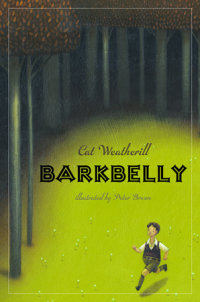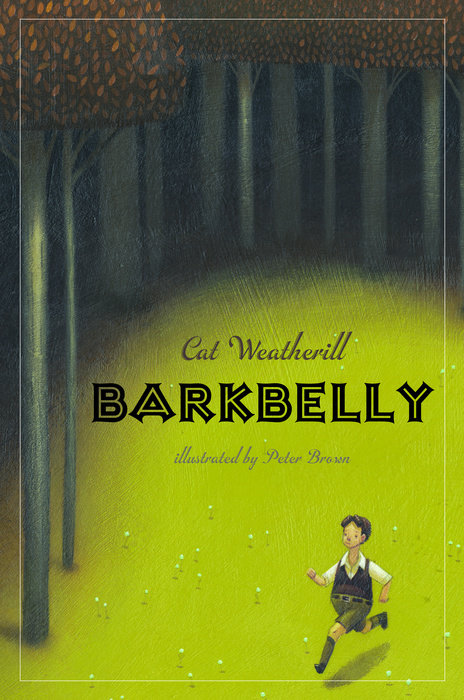Chapter 1
Fish Patterson pulled out a grubby handkerchief and mopped his brow. It was still early, but already he could feel the heat rising. Sunbeams were dancing on the roofs in Pumbleditch.
I should be down at the river on a day like this, he thought, not stuck in a field with the oldies. But everyone had to help with the harvest. That was the rule. For two exhausting weeks, every Pumbleditcher had to sweat and heave and tie and truss until the fields were stubbly as chins.
His mates were already at work--if shoving wheat stalks down someone's shirt could be called work. Moth, Dipper, Log: they were all there, over on the far side of the field. Even at this distance Fish could hear Moth's protests. He was writhing around on the ground, shouting and laughing in turn. Poor Moth. Always the victim.
Fish felt someone tugging at his sweater, as if it weren't baggy enough already. He knew it was Little Pan Evans before he heard his voice.
"Fish! Fish!"
"What?" He looked down onto a face…
Chapter 1
Fish Patterson pulled out a grubby handkerchief and mopped his brow. It was still early, but already he could feel the heat rising. Sunbeams were dancing on the roofs in Pumbleditch.
I should be down at the river on a day like this, he thought, not stuck in a field with the oldies. But everyone had to help with the harvest. That was the rule. For two exhausting weeks, every Pumbleditcher had to sweat and heave and tie and truss until the fields were stubbly as chins.
His mates were already at work--if shoving wheat stalks down someone's shirt could be called work. Moth, Dipper, Log: they were all there, over on the far side of the field. Even at this distance Fish could hear Moth's protests. He was writhing around on the ground, shouting and laughing in turn. Poor Moth. Always the victim.
Fish felt someone tugging at his sweater, as if it weren't baggy enough already. He knew it was Little Pan Evans before he heard his voice.
"Fish! Fish!"
"What?" He looked down onto a face as eager as a puppy's.
"One of the harness rats is being real nasty," said Pan, hopping from foot to foot. "In the next field. I'm going to tell the lads." He sprinted away.
Fish thought for a moment. Did he really want to watch someone fighting a rat as big as a lion, with teeth like penknives and claws like daggers? Yes. Oh, yes!
Fish sped into the next field.
The harness rats powered the tractors. They were devils to handle if they were angry, and this morning one was. The handlers had it trapped in a corner of the field. They had ropes, but Fish could see that the rat wasn't going to be harnessed without a fight. It bared its teeth and gripped the earth with polished claws.
"He's wicked," said a familiar voice at his side. Moth Williams. "Look at those eyes. They'll never get him in the wheelcage."
"Course they will," said Dipper Dean, coming up behind. "They just need to get those ropes round his neck, then they can haul him in. They'll have to mind his tail, though."
The gang watched as the men positioned themselves. Boot Marlow, the head rat handler, was a brawny man with watery eyes and a beard like a hawthorn hedge. Next to him was Sock Samuels, a thin man with patched trousers and foul feet. And lastly, Rag Weaver, the youngest of the three--little more than a lad, with a thatch of yellow hair and a gap-toothed grin. He wasn't smiling now, though. He was terrified. The rope dangled in his hands like a dead adder.
"I think they should forget about the ropes," said Log Worthing, last to arrive as usual. "If Sock Samuels took off his shoes, they could hold him like a battering ram and the stink from his feet would stun that rat."
Fish grinned. "That's too cruel! I like this rat. Look at it his way. Once he's in that wheelcage, he'll have to run round and round all day. I'd put up a fight too."
But the rat didn't have time to fight. Suddenly three ropes dropped over his head and the nooses tightened as the men pulled. The rat reared up on his back legs, but the men held him fast and others ran to join them. The rat was dragged along the ground. His claws furrowed the earth. He thrashed his tail, but the men were expecting that and kept well clear. He hissed uselessly. Big as he was, there were just too many of them.
The lads watched as he was bullied into an empty wheelcage. The men closed the door and slipped the ropes off his head. The rat sniffed the air. There was a rat in the other wheelcage--he could smell its misery. Then the men pushed the tractor from behind and the wheelcages began to turn. The rat started to run; he had no choice. The wheelcages turned faster and faster as the tractor gathered momentum and then they settled into a steady rhythmic roll. Another day's work had begun.
"Poor thing didn't stand a chance," said Moth.
"Never do," said Dipper.
"I like rats," said Little Pan Evans, though he knew no one would be listening to him.
"We should be getting back now," said Log. "We'll be missed."
They started to walk off. In the other field, they saw Gable Gantry, the village carpenter, mending a broken wheelcage. He nodded to them as they passed.
"I like him," said Moth while they walked on.
"Yes, he's all right," said Fish.
"Stand back!" said Log.
A tractor was rumbling toward them, driven by Farmer Gubbin. There was a shushing of blades as it scythed past, then--thuud!--the blades struck something hard. Whatever it was went hurtling through the air toward Gable Gantry and--uurgh!--smacked him hard on the head. He went down like a bowling pin.
"Whoa!" said Fish. "Old man down!"
The gang whooped and whistled and ran over for a closer look. But when they reached him, Gable Gantry was scary. He wasn't moving. Thick, dark blood dripped from the wound in his forehead.
"He's dead!" cried Little Pan Evans.
"He can't be," said Fish. He knelt down and put his ear close to the old man's face. He listened. He frowned.
"Is he dead?" whispered Moth. There was no reply. "Fish! Is he dead?"
Fish looked up. His face was pale as paper. "I can hear him breathing," he said gravely. Then he grinned and Little Pan Evans punched him.
People started running over from all parts of the field. They made a ring round the old man, still holding the tools they had been working with. They nudged each other, whispered, shuffled closer like cows. Suddenly Gable shuddered and screwed up his face. Then he opened his eyes and found himself surrounded by villagers. Some of them were trying to help him up. Some of them were telling him to lie down. His head ached and his sight was fuzzy.
"What happened?" he croaked.
"You were hit by this," said Fish, and he gave him a lump of mud.
Gable rubbed the object between his fingers. The mud started to flake off. It looked like an egg. A wooden egg, no larger than a goose egg, but much heavier. "What on earth is it?" he said.
"Goodness knows!" said Farmer Gubbin, climbing down from his tractor. "It was just lying there on the ground. I've never seen anything like it before. I doubt if anyone here has!"
He was right. No one had.
"Well," said Gable, offering the egg to the farmer, "if it was on your land, happen it's yours by right."
"Eh, no!" cried Farmer Gubbin. "I don't want it! You keep it, Gable! To remind you of your adventure!"
So Gable wrapped the egg in his handkerchief and took it home to show his wife.

